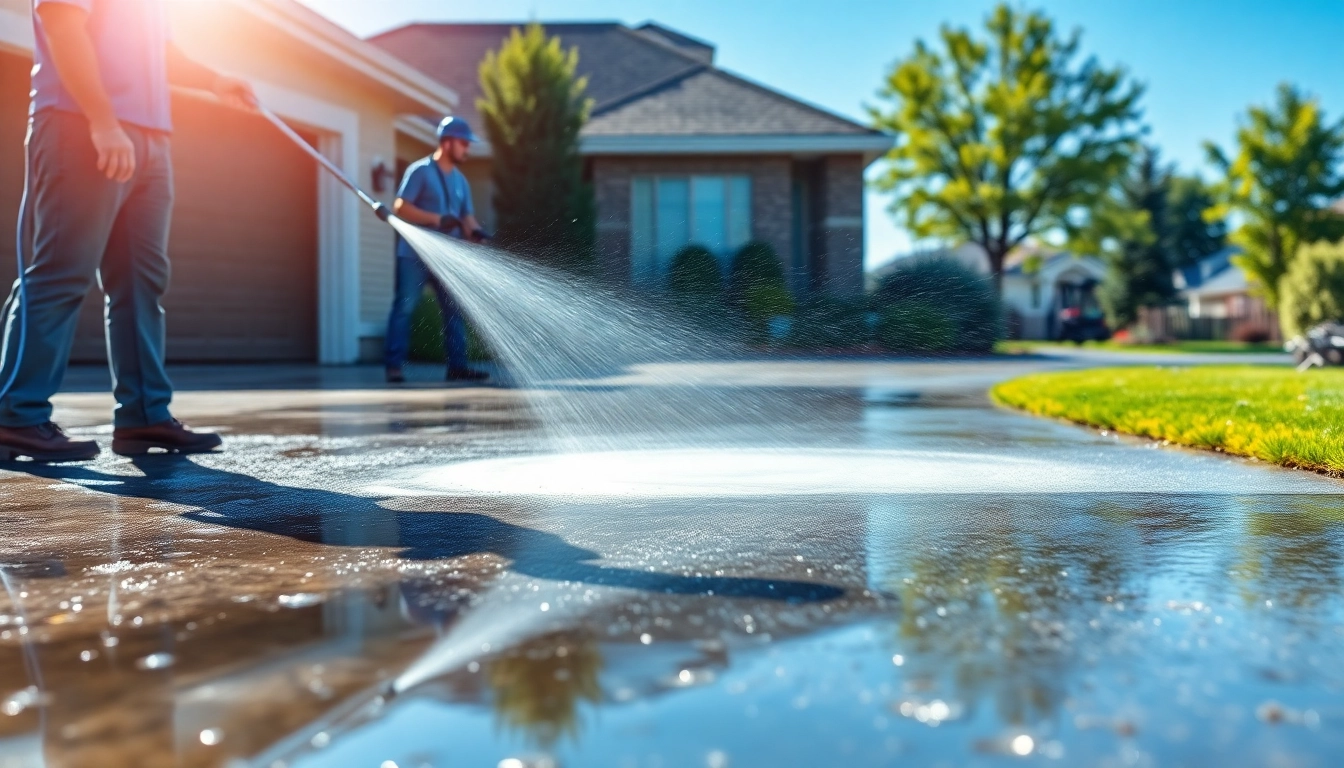Understanding Pressure Washing Basics
What Is Pressure Washing?
Pressure washing, often referred to as power washing, is a cleaning method that utilizes high-pressure water spray to eliminate dirt, grime, mold, and other unwanted substances from various surfaces. It is a versatile cleaning technique that can effectively restore the appearance and integrity of residential and commercial properties. The process works by using powerful water jets, which can reach pressures of up to 4,000 PSI (pounds per square inch) or more, allowing them to tackle even the most stubborn stains and debris.
The Benefits of Pressure Washing
Engaging in regular pressure washing offers numerous benefits, including:
- Enhanced Curb Appeal: Clean surfaces can instantly improve the visual appeal of your property, making it more inviting and appealing to guests or potential buyers.
- Preventative Maintenance: By removing mold, algae, and grime, pressure washing can prevent deterioration and extend the lifespan of surfaces, reducing the need for costly repairs.
- Health Benefits: Mold and mildew can be harmful to health, especially for those with allergies or respiratory issues. Pressure washing eliminates these hazards, promoting a healthier environment.
- Increased Property Value: Regular cleaning can enhance property value by presenting a well-maintained appearance that attracts buyers and renters.
Common Surfaces for Pressure Washing
Pressure washing is effective on a variety of surfaces, including:
- Driveways: Remove oil stains, tire marks, and dirt accumulation.
- Decks and Patios: Restore wooden or concrete surfaces to their original look.
- Roofs: Clear away moss, algae, and debris, prolonging the life of your roofing materials.
- Brick and Concrete Walls: Enhance the appearance of facades by eliminating mildew and grime buildup.
- Fences: Clean wooden or vinyl fencing to restore its original color and prevent rot.
Choosing the Right Equipment for Pressure Washing
Types of Pressure Washers Explained
Choosing the right pressure washer is crucial for achieving the best results. Here are the main types:
- Electric Pressure Washers: Ideal for light to medium-duty tasks, these machines are quieter and require less maintenance. They are great for residential use on driveways, patios, and vehicles.
- Gas Pressure Washers: These are more powerful and suitable for heavy-duty cleaning tasks. They offer higher PSI levels and are great for large areas, including commercial spaces.
- Hot Water Pressure Washers: These models combine pressure with hot water, making them effective for grease stains, oil spills, and industrial cleaning. They are often used in commercial applications.
Essential Accessories for Effective Pressure Washing
To enhance your pressure washing experience and results, consider these essential accessories:
- Surface Cleaners: These attachments allow for even and efficient cleaning of large flat surfaces like patios and driveways.
- Rotary Nozzles: These provide a spinning spray pattern that can effectively remove stiff dirt and grime.
- Soap Dispensers: Ideal for pre-treating surfaces to loosen dirt buildup before actual washing.
Maintenance Tips for Pressure Washing Equipment
Proper maintenance extends the life of your pressure washing equipment. Follow these tips:
- Regular Cleaning: Clean the filters after each use to maintain optimal performance.
- Storage: Store the unit in a dry, sheltered location to protect it from the elements.
- Hose Inspection: Regularly check hoses for wear or leaks, replacing them as necessary.
Preparing for a Pressure Washing Service
How to Choose a Professional Pressure Washing Service
Finding the right professional pressure washing service can significantly impact the quality of your clean. Consider the following when making your choice:
- Experience: Look for a company with a track record of success and positive customer feedback.
- Services Offered: Ensure they provide services that fit your specific needs, whether residential or commercial.
- Insurance and Licensing: A reputable service should have appropriate insurance and licensing to protect you and their workers.
What to Expect During a Pressure Washing Appointment
During a professional pressure washing appointment, you can expect a systematic approach:
- Site Assessment: The technician will evaluate the surfaces and identify problem areas.
- Pre-Treatment: Any necessary pre-treatment with special cleaning agents will occur to maximize cleaning effect.
- Pressure Washing: The actual cleaning process will begin, focusing on one area at a time.
- Post-Cleaning Check: Afterward, the technician will inspect the results and may offer additional treatments if required.
Preparing Your Property for Pressure Washing
Proper preparation of your property can enhance the effectiveness of pressure washing. Here are some steps:
- Clear the Area: Remove furniture, decorations, and other items from the cleaning site.
- Protect Plants: Cover or move flowers, shrubs, and gardens to avoid exposure to high-pressure water or cleaning agents.
- Check for Damage: Inspect all surfaces for cracks or peeling paint that may need special attention during cleaning.
Best Practices in Pressure Washing
Safety Measures to Follow
Safety is paramount when pressure washing. Implement these safety practices:
- Wear Protective Gear: Always wear safety goggles, gloves, and appropriate clothing to protect against flying debris and wet conditions.
- Check Equipment: Inspect all equipment for faults or damages before use to prevent accidents.
- Be Aware of Surroundings: Be cautious of electrical lines, windows, and other delicate areas that can be damaged by pressure.
Environmental Considerations in Pressure Washing
When pressure washing, consider the environmental impact. Here are some best practices:
- Use Eco-Friendly Cleaning Agents: Opt for biodegradable soaps and detergents to minimize environmental harm.
- Manage Runoff: Avoid pressure washing on days with heavy rainfall where runoff can affect local waterways.
- Proper Waste Disposal: Ensure that any debris or waste is collected and disposed of according to local regulations.
Pressure Washing Techniques for Different Surfaces
Different surfaces require different pressure washing techniques for optimal results:
- Concrete: For tough stains, use a rotary nozzle and higher pressure to effectively remove stubborn grime.
- Wood: Always use low pressure to avoid damaging the wood fibers; be cautious of splintering.
- Windows: Use a dedicated wash nozzle or soft brush attachment to avoid streaking and damage.
Measuring the Impact of Pressure Washing
Assessing Cleanliness: Before and After Comparisons
One effective way to measure the impact of pressure washing is through before and after photos. This visual documentation enables you to compare the cleanliness and enhance the aesthetic appeal of the surface. Being able to visibly see the difference can also provide proof of the effectiveness of your maintenance efforts.
Cost-Benefit Analysis of Regular Pressure Washing
Conducting a cost-benefit analysis of regular pressure washing can demonstrate its value over time. Regular cleaning can prevent the need for expensive repairs and improve the efficiency of your surfaces, providing a good return on investment. An average cost of pressure washing can range from $500 to $900 for larger home exteriors, but savings on repairs can be significant in comparison.
Long-term Benefits of Investing in Pressure Washing
Investing in regular pressure washing services yields long-term benefits. These benefits include:
- Increased Longevity: Periodic cleaning expands the life of surfaces, be it your driveway, siding, or roofing materials.
- Improved Energy Efficiency: Cleaning surfaces like roofs can enhance building insulation, leading to savings on energy bills.
- Brand Image: For businesses, a well-maintained property directly influences customer perception and can enhance brand reputation.



